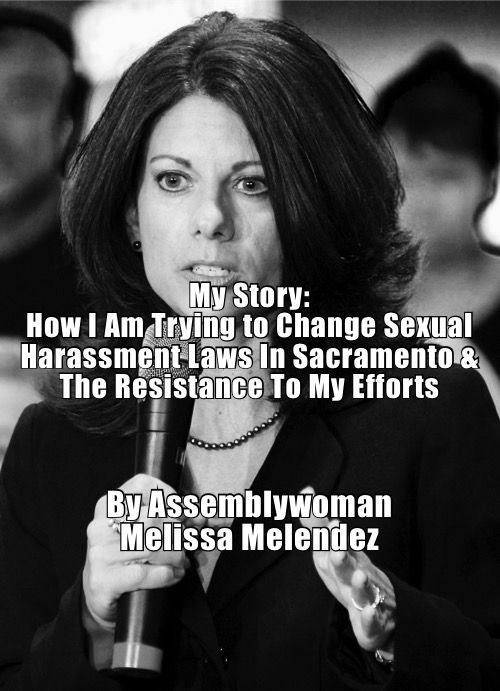My Story: How I am Trying to Change Sexual Harassment Laws In Sacramento & The Resistance To My Efforts
With so much having been written about sexual harassment lately, it’s hard to come up with anything new to say, other than: “If you all could knock it off, that would be great.”
If only it could be so.
We know that it’s pervasive in Hollywood. We’ve learned that from the Weinstein scandal. It also appears it’s also pervasive in the news world.
But that is not all.
Now we have politicians who are in the spotlight for their misdeeds.
The very sad part for me, as an Assemblywoman, is that I’m watching a scenario play out in Sacramento much like what I saw happen during my time in the U.S. Navy. Back then, sexual harassment victims had no place to turn for so very long.
When I arrived in Sacramento, I learned that state workers in California have whistleblower protection. It was written into law years ago.
What I didn’t know was that a very specific group of state workers were denied that protection. Who might you ask? Legislative staffers that’s who.
Keep in mind that that group of employees works directly for legislators. They are the chiefs of staff, the schedulers, the legislative aides and the field representatives. Literally, they are the people who work closest with politicians.
Yet, as we are finding out, they are left to blow in the wind. There is no shelter for them should they decide to report that their boss is engaging in bribery, corruption or sexually harassing them.
Given that newfound knowledge, I set out to write a bill that would extend that whistleblower protection to legislative staffers. I wondered to myself, “Was it just an oversight? Surely they didn’t exclude this group purposely.”
I suppose that was naïve, but I do try to give people the benefit of the doubt. I thought my bill would be considered a superb idea, that maybe someone might even think: “I wish I thought of that.” I also thought that the bill would be passed and signed into law without any delay.
That didn’t happen.
My Bill did sail through the Assembly. I received full bipartisan support, no bickering. My colleagues recognized what a horrible oversight had taken place.
Then my bill was then sent to the Senate where I’d hoped it would be met with the same warm reception as in the Assembly.
Except my bill still has not made it out of the Senate.
In fact, it didn’t even get to the floor for a vote. For four years in a row, that bill was placed in the “suspense” file, the legislative purgatory, where bills languish never to see the light of day. To this day, I’ve never been given a reason why the bill has been killed four times.
We’ve had one Assemblyman resign within the last week over sexual harassment charges. A state Senator has been accused by several young women of not only unwanted sexual advances, but being fired for reporting them. He remains in office, insisting he is innocent. And this is just the beginning.
There are plenty more women who plan to come forward with their stories of being harassed by legislators. But there are also plenty who simply left their job behind altogether, no longer willing to work for an institution that protects the predator and not the prey.
The Assembly recently held a hearing on sexual harassment in the Capitol, and the testimony from the few victims who were willing to come forward was stunning. Support for my bill, AB403, once again came from both sides of the aisle, from legislators and victims alike.
It was abundantly clear that the system for reporting is not only fatally flawed, confusing to understand, but set up in a way that actually discourages reporting. And I can’t help but think that if my bill had passed out of the Senate four years ago, perhaps that hearing wouldn’t have been necessary at all.
Women everywhere are tired of being abused and harassed by powerful men. In our state capitol, they’ve adopted the motto: “We said enough.” That’s their way of saying they want politicians to stop talking and start acting. Whistleblower protection isn’t the sole solution to the problem, but no real solution can be put into practice without it.







